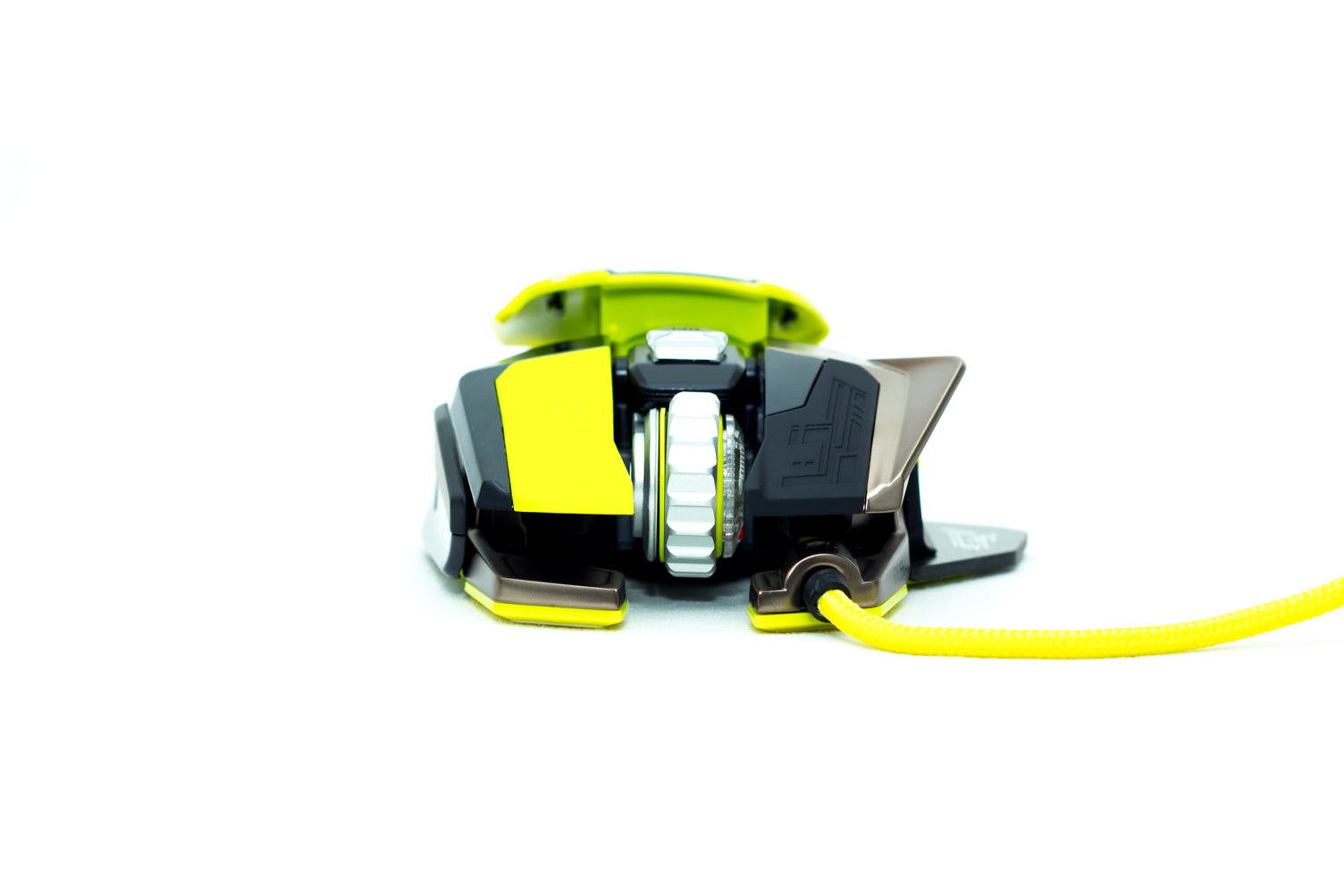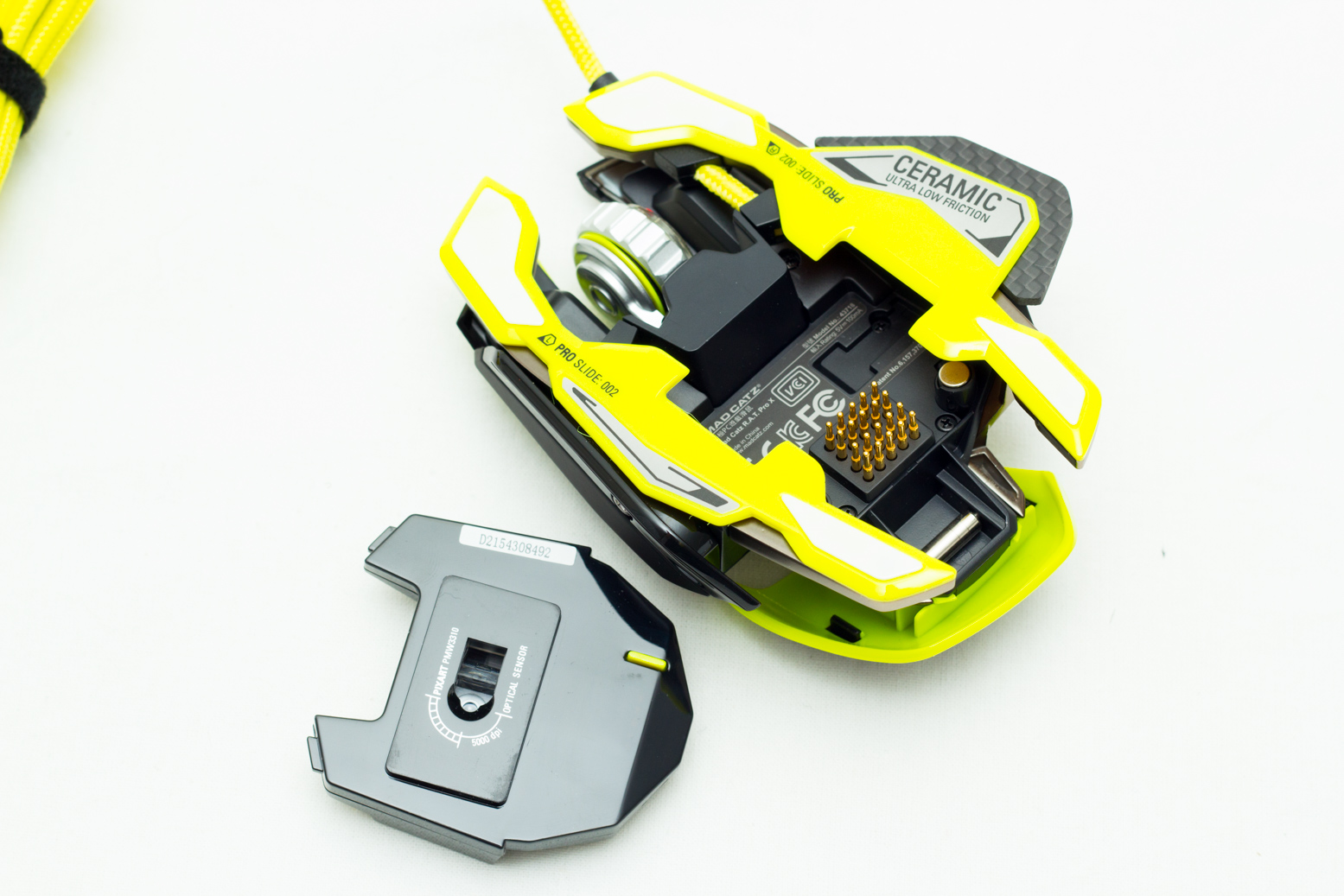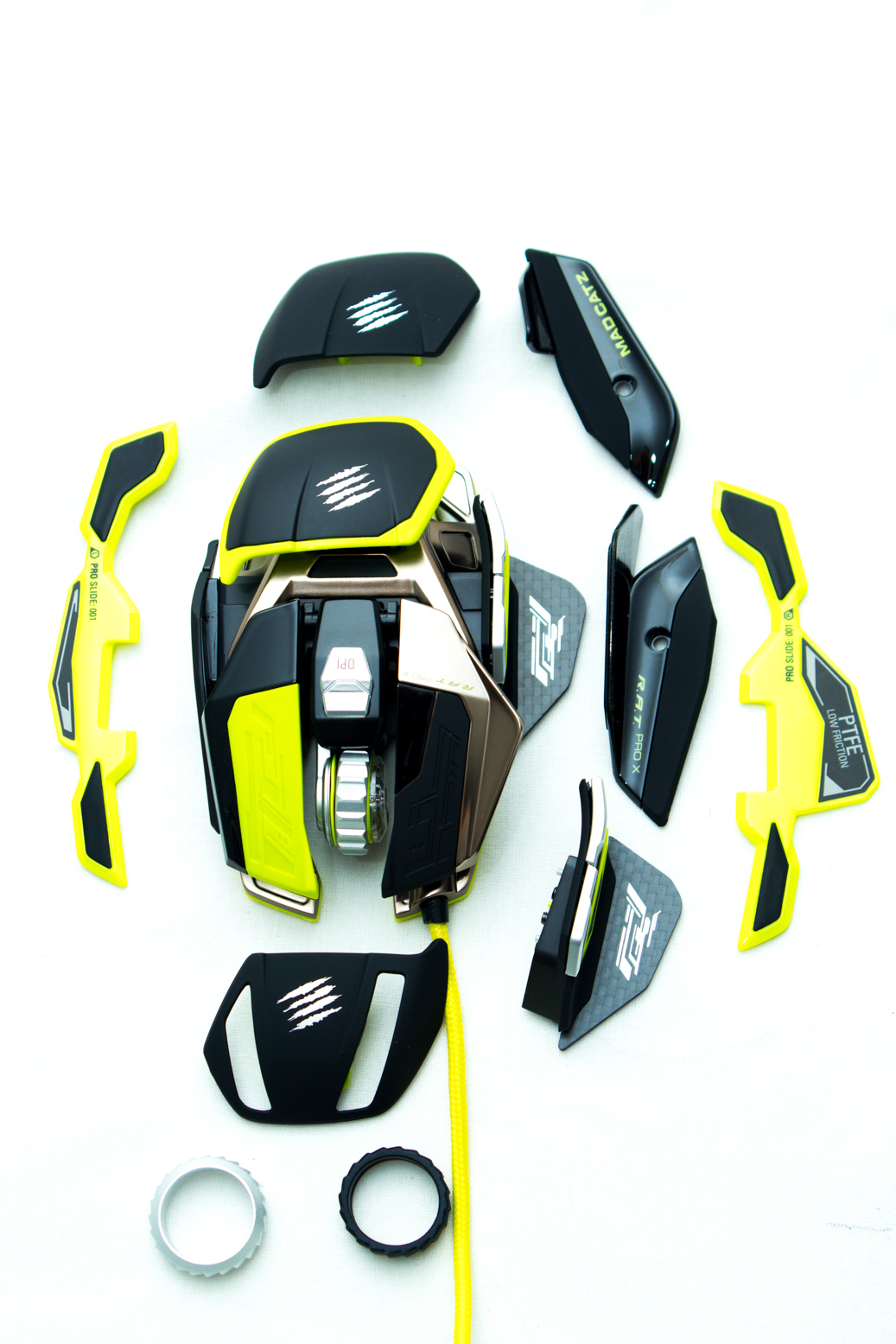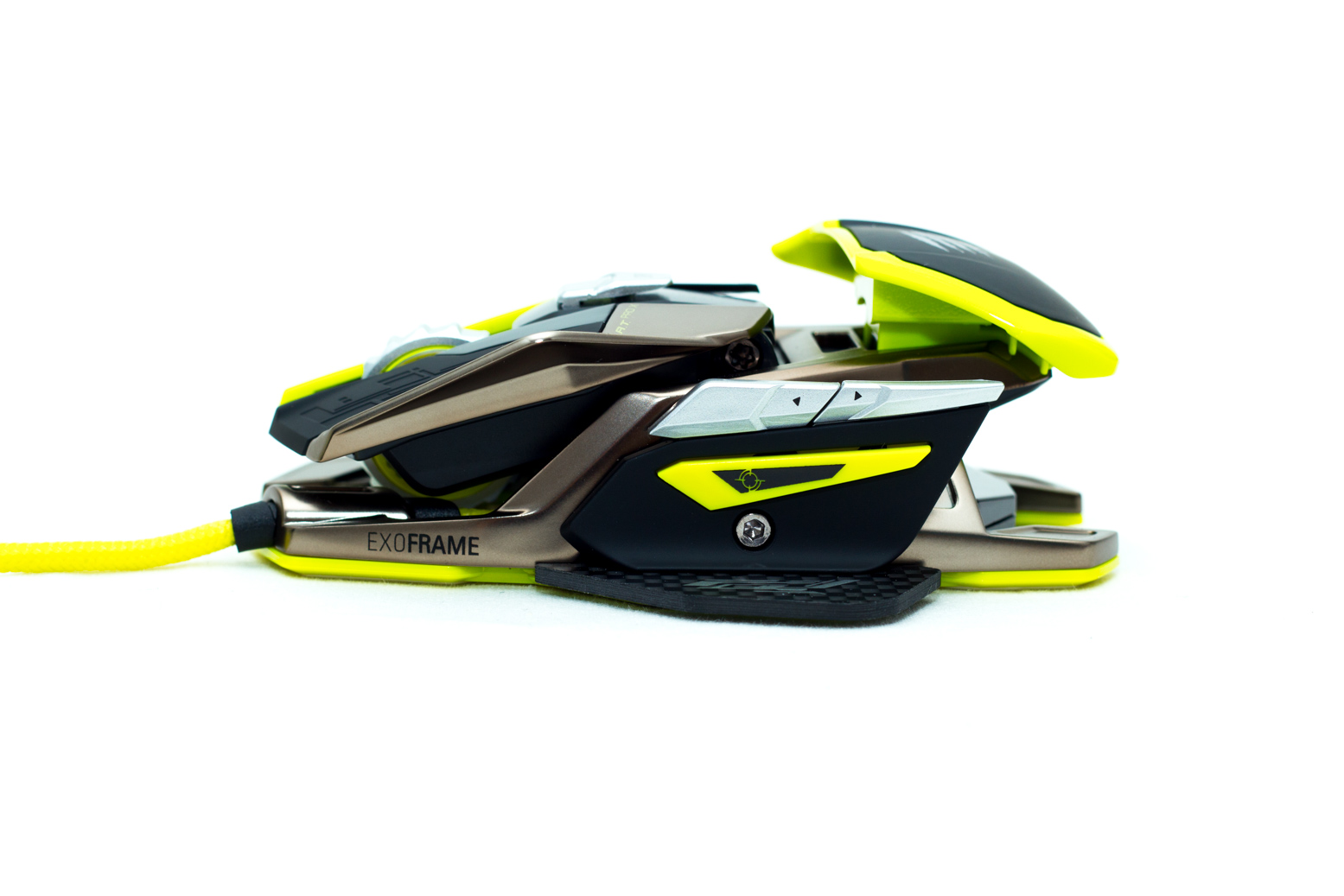Our Verdict
The Mad Catz R.A.T. Pro X offers a ton of customization options built on a sturdy chassis, but will set you back a couple Benjamins. It's also neon yellow.
PC Gamer's got your back
Cheesecake: Remarkable customization; unique design; great performance; built like a tank
Fruitcake: Expensive; software needs work; neon yellow isn't for everyone
The Mad Catz Pro X looks as if Optimus Prime crashed through your window and decided that being held by a nerd is a better deal than dueling with robots. Brought to you by the same company that made the horrendous GameCube controllers, the Mad Catz R.A.T. Pro X is looking to be the last gaming mouse you’ll ever purchase. Built with the cumulative experiences from generations of R.A.T. series gaming mice, the R.A.T. Pro X embodies the series’ deep respect for gamers’ freedom by offering an astounding level of customization.
To make sure that it leaves no hand behind, the R.A.T. Pro X comes with a variety of interchangeable parts including a spare set of left grips, three different right grips, a removable sensor module, and two pairs of mouse feet. These are parts that you’ll actually want to use. For example, one of the right grips comes with a pinkie hook designed specifically for palm grip users, and the mouse feet come in both Teflon and ceramic for different smoothness. Props to Mad Catz for its attention to detail.
Most parts, such as the mouse feet, attach magnetically for easy removal. Parts such as the thumb rest that require extra rigidity is fixed in place with a small screw. Mad Catz has also thrown in an Allen wrench so you don’t have to dig through your tool shed for one.

We thought that the R.A.T. Pro X would be a wobbly mess with all those moving parts. Fortunately, we were completely off the mark with that assumption. At the core of the R.A.T Pro X is a durable magnesium alloy chassis. Because all the parts that receive the most force are either screwed in or clamped on to the metal frame, the body feels very rigid. The magnetized sensor module and mouse feet are held together firmly as well.
With all the ways you can configure the R.A.T. Pro X, there’s a sweet spot for almost everyone. The default palm rest can pivot, retract, or be completely replaced with a lower profile one. The right side grip can be outfitted with a pinkie rest. The entire mouse is finished with grippy soft rubber, and the left and right mouse buttons are textured for improved traction.
But the most unique component of the R.A.T. Pro X is its interchangeable sensor module. Our review sample came with the highly-regarded Pixart PMW3310 optical sensor rated at 5000DPI. While we’re perfectly content with its relatively low DPI ceiling, gamers looking for a speedier tracking experience can opt for the Philips PLN2038 Twin-Eye laser sensor or the Pixart ADNS 9800 laser sensor, both of which are rated at 8200DPI. They can be purchased individually on the Mad Catz store.

Staying true to its reputation, the stability of the Pixart PMW3310 is excellent. With that said, part of the reason it works so wonderfully in this mouse is due to its slick ceramic mouse feet. They aren’t particularly big, but their smoothness is close to perfection. Lift distance can be adjusted between 0mm to 1mm. We couldn’t completely eliminate the lift distance, but we got it low enough to not affect our game.
Keep up to date with the most important stories and the best deals, as picked by the PC Gamer team.
Weight is the only component of the R.A.T. Pro X that isn’t adjustable. Despite having an alloy chassis, The R.A.T. Pro X weighs a feathery 105g (3.7oz). Fans of heavier mice may want to use the Teflon mouse feet and a softer mouse pad for additional control.
The R.A.T. Pro X has a tame button layout despite its wild appearance. Besides the primary mouse buttons, there’s only three side buttons, a DPI switch, and the scroll wheel. The left mouse button has a much shorter travel than the right to make it easier to rapid tap. The side buttons are tactile, but they’re a little on the thin side.

While most scroll wheels today pivot laterally to add two extra buttons under the gamer’s fingers, the scroll wheel on the R.A.T. Pro X takes it to the next level. Coined by the company as the Strafe Arm, the scroll wheel’s pivoting arm acts as an analogue joystick. We didn’t find much use of this however, since using it would mean taking our index finger off of the left mouse button. The rolling resistance of the scroll wheel can be tuned with the included Allen key. Three sets of rings with distinct levels hardness and texture are also included.
A sharp design is essential in impressing your fellow gamers, and the R.A.T. Pro X nails it. We love the cold metallic gleam seeping through the seams of the jagged plastic plates. Equally sexy is its carbon fiber textured thumb rest. Although we’re generally lenient on color, we aren’t too thrilled about its the neon yellow accent. Maybe this is done to compensate for the lack of LED lighting, but it’s a touch too bright to match anything on our desk. That does help it draw attention though, and in the end it’s still a fantastic looking mouse.
With all that’s going for the R.A.T. Pro X, the only thing that marred its perfect streak is its cluttered and disorganized driver software. Sensor settings such as DPI and polling rate are placed in a different section than lift distance. The macro management page features an intuitive drag-and-drop interface, but you have to go to a different page to program the DPI adjustment controls. The “Settings” tab has just three settings that should’ve been integrated into the “Programming” tab, which in turn should be re-named to “Settings”. If the software could be touched up, then it will complete the customization experience.
Sitting at $200, the R.A.T. Pro X has a wallet-gutting price tag that rivals the cost of a budget graphics card. But looking at the long term, the R.A.T. Pro X will bring you years and years of gaming enjoyment. With great hardware, amazing flexibility, and a design that will keep visitors wowed for years, the R.A.T. Pro X is a worthwhile purchase, if you've got the dough.
The Mad Catz R.A.T. Pro X offers a ton of customization options built on a sturdy chassis, but will set you back a couple Benjamins. It's also neon yellow.


